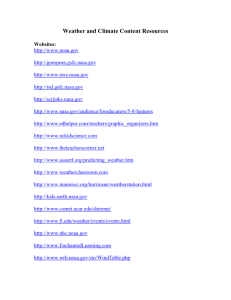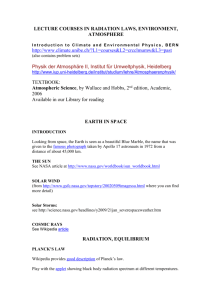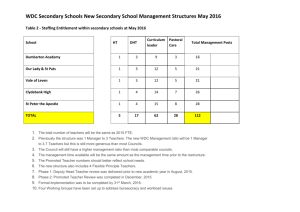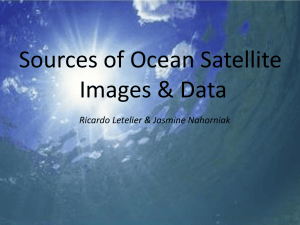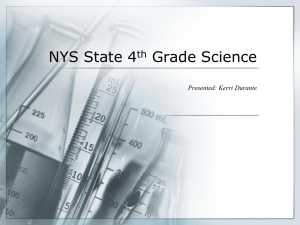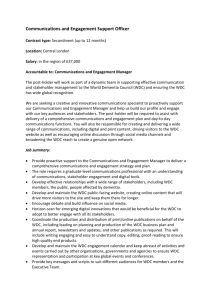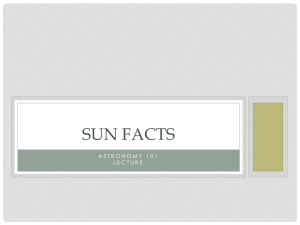US Forum on CODATA
advertisement
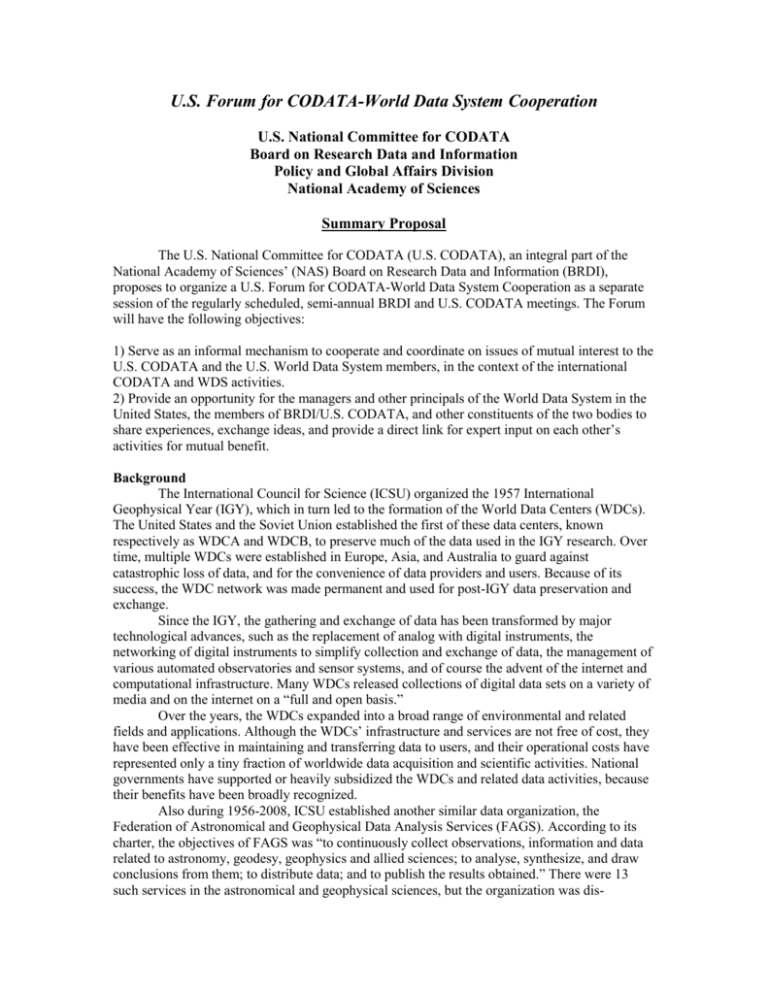
U.S. Forum for CODATA-World Data System Cooperation U.S. National Committee for CODATA Board on Research Data and Information Policy and Global Affairs Division National Academy of Sciences Summary Proposal The U.S. National Committee for CODATA (U.S. CODATA), an integral part of the National Academy of Sciences’ (NAS) Board on Research Data and Information (BRDI), proposes to organize a U.S. Forum for CODATA-World Data System Cooperation as a separate session of the regularly scheduled, semi-annual BRDI and U.S. CODATA meetings. The Forum will have the following objectives: 1) Serve as an informal mechanism to cooperate and coordinate on issues of mutual interest to the U.S. CODATA and the U.S. World Data System members, in the context of the international CODATA and WDS activities. 2) Provide an opportunity for the managers and other principals of the World Data System in the United States, the members of BRDI/U.S. CODATA, and other constituents of the two bodies to share experiences, exchange ideas, and provide a direct link for expert input on each other’s activities for mutual benefit. Background The International Council for Science (ICSU) organized the 1957 International Geophysical Year (IGY), which in turn led to the formation of the World Data Centers (WDCs). The United States and the Soviet Union established the first of these data centers, known respectively as WDCA and WDCB, to preserve much of the data used in the IGY research. Over time, multiple WDCs were established in Europe, Asia, and Australia to guard against catastrophic loss of data, and for the convenience of data providers and users. Because of its success, the WDC network was made permanent and used for post-IGY data preservation and exchange. Since the IGY, the gathering and exchange of data has been transformed by major technological advances, such as the replacement of analog with digital instruments, the networking of digital instruments to simplify collection and exchange of data, the management of various automated observatories and sensor systems, and of course the advent of the internet and computational infrastructure. Many WDCs released collections of digital data sets on a variety of media and on the internet on a “full and open basis.” Over the years, the WDCs expanded into a broad range of environmental and related fields and applications. Although the WDCs’ infrastructure and services are not free of cost, they have been effective in maintaining and transferring data to users, and their operational costs have represented only a tiny fraction of worldwide data acquisition and scientific activities. National governments have supported or heavily subsidized the WDCs and related data activities, because their benefits have been broadly recognized. Also during 1956-2008, ICSU established another similar data organization, the Federation of Astronomical and Geophysical Data Analysis Services (FAGS). According to its charter, the objectives of FAGS was “to continuously collect observations, information and data related to astronomy, geodesy, geophysics and allied sciences; to analyse, synthesize, and draw conclusions from them; to distribute data; and to publish the results obtained.” There were 13 such services in the astronomical and geophysical sciences, but the organization was dis- established in 2008 with a view for all these existing data services to join the new World Data System. Upon completion of a report and recommendations by the ICSU Strategic Committee on Information and Data (SCID), ICSU established the World Data System (WDS) in 2010 to facilitate a coordinated global approach to scientific data and information by the WDCs, FAGS, and CODATA. The emerging WDS of today is thus the legacy and successor organization of the IGY and the WDCs. The functional structure of the WDS is designed to achieve three main objectives: (1) long- term stewardship of scientific data; (2) data and metadata services, including data analysis, and (3) data “publication” services. Japan hosts the newly established International Program Office for the WDS. The Committee on Data for Science and Technology (CODATA) is an interdisciplinary Scientific Committee of the ICSU, established in 1966 to promote and encourage, on a worldwide basis, the compilation, evaluation and dissemination of reliable numerical data of importance to science and technology. CODATA’s main objectives are: (1) the improvement of the quality and accessibility of data, as well as the methods by which data are acquired, managed, analyzed and evaluated, with a particular emphasis on developing countries; (2) the facilitation of international cooperation among those collecting, organizing, and using data; (3) the promotion of an increased awareness in the scientific and technical community of the importance of these activities; and (4) the consideration of data access and intellectual property issues. The National Academy of Sciences founded the U.S. CODATA committee in the 1970s to promote U.S. scientific interests in these areas and to serve as a focal point for U.S. participation in the international CODATA activities. Since 2008, the U.S. CODATA has functioned under the auspices of the newly formed Board on Research Data and Information (BRDI). Details of U.S. CODATA activities under BRDI and before may be found at www.nas.edu/brdi. Additional information about the WDC, WDS, and CODATA may be found in the References under Appendix B. BRDI and the USNC/CODATA now propose to establish the U.S. Forum for CODATA and WDS Cooperation to achieve the objectives set forth in the summary task statement above. Work Plan To implement the objectives of the U.S. Forum for CODATA-World Data System Cooperation, the BRDI/U.S. CODATA will organize a half-day meeting of the Forum once or twice per year, as mutually agreed with the members of the U.S. WDS. The Forum is expected to be held periodically in conjunction with the regularly scheduled, semi-annual meeting of BRDI/U.S. CODATA. The U.S. WDS participants will be invited to attend all open portions of the entire BRDI/U.S. CODATA meeting. The director of each U.S. WDS (or the designated representative) will be invited to participate, and the meeting will be open to other interested parties. Appendix A lists all the U.S. data centers and organizations that have expressed an interest in becoming WDS members. The U.S. WDS managers will be responsible for their own travel costs to the Forum and the other portions of the BRDI/U.S. CODATA meeting. The BRDI/U.S. CODATA will pay for the on-site expenses associated with the meeting. A summary of the main deliberations and action items from the Forum will be prepared and posted on the BRDI website after review by the participants and the Policy and Global Affairs Division, as soon as possible after each meeting. Staff Contact Paul F. Uhlir, J.D. Director, BRDI and U.S. CODATA National Academy of Sciences E-mail: puhlir@nas.edu APPENDIX A List of U.S. Data Centers with Expressions of Interest in the World Data System Facility Name Host Institution(s) Country Web Site Alaska Satellite Facility Geophysical Institute, Fairbanks USA http://www.asf.alaska.edu/ WDC - Human Interactions in the Environment Center for International Earth Science Information Network, Columbia University USA http://sedac.ciesin.columbia .edu/wdc/ Tropical Ecology Assessment and Monitoring (TEAM) Initiative Conservation International USA? Department of Oceanography, Texas A&M university WDC - Remotely Sensed Land Data Former Contact Email Comments Nettie La BelleHamer nettie.labellehamer@alaska.edu Robert S. Chen bchen@ciesin.columbia.edu http://teamnetwork.org Eric Fegraus efegraus@conservation.org USA http://ocean.tamu.edu/profil e/ZWang Zhankun Wang g.zhankunwang@gmail.com Earth Resources Observation and Science (EROS) Center, USGS USA http://edc.usgs.gov/wdcguid e.html oleson@usgs.gov eidenshink@usgs.gov kalvelage@usgs.gov Incorporated Institutions for Research in Seismology (IRIS), Data Management System International GNSS Service National Science Foundation (NSF), USA USA http://www.iris.edu Lyndon R Oleson will retire New contacts: Dr. Jeff Eidenshink, EROS Deputy Director or Mr. Tom Kalvelage, Tim Ahern NASA USA http://igs.org Ruth Neilan ruth.e.neilan@jpl.nasa.gov International Laser Ranging Service NASA USA http://ilrs.gsfc.nasa.gov Carey Noll Carey.Noll@nasa.gov International Union of Geological Sciences USA? http://IUGS.org Alberto C. Riccardi riccardi@museo.fcnym.unlp.edu.ar Secretariat in USA International Union of Pure and Applied Chemistry USA? http://iupac.org Nicole J. Moreau Dr Richard M. Hartshorn nj.moreau@free.fr richard.hartshorn@canterbury.ac.nz Send to all contacts; Secretariat in USA WDC - Human Interactions in the Environment WDC Remotely Sensed Land Data FAGS International GNSS Service Secretariat in USA Send to all contacts tim@iris.washington.edu Secretariat in USA International VLBI Service for Geodesy and Astrometry, NASA NASA USA http://ivscc.gsfc.nasa.gov Crustal Dynamics Data Information System (CDDIS) WDC - Meteorology, Asheville NASA GSFC USA http://cddis.nasa.gov National Climatic Data Center, NOAA USA http://www.ncdc.noaa.gov/ oa/wdc/index.php WDC - Geophysics, Boulder National Geophysical Data Center, NOAA USA http://www.ngdc.noaa.gov WDC Oceanography, Silver Spring WDC - Glaciology National Oceanographic Data Center, NOAA USA http://www.nodc.noaa.gov National Snow and Ice Data Center, University of Colorado USA http://nsidc.org/wdc/ WDC - Satellite Information National Space Science Data Center, NASA USA http://nssdc.gsfc.nasa.gov WDC - Biodiversity and Ecology U.S. Geological Survey USA http://biology.usgs.gov/bio/ WDC - Seismology U.S. Geological Survey USA http://earthquake.usgs.gov/ NASA DAACs / EOSDIS / ESIPS / CDDIS / IGS, VBLI, SLR Global Hydrology Resource Center NASA USA NASA USA FAGS International VLBI Service for Geodesy and Astrometry Dirk Behrend Dirk.Behrend@nasa.gov Carey Noll carey.e.noll@nasa.gov WDC Meteorology, Asheville comprising all WDCs at NGDC - WDC - Geophysics and Marine Geology and WDC - Solar Terrestrial Physics, Boulder WDC Oceanography, Silver Spring WDC Glaciology Howard Diamond howard.diamond@noaa.gov Christopher G. Fox christopher.g.fox@noaa.gov Sydney Levitus Sydney.levitus@noaa.gov Roger G. Barry & Mark Parsons rbarry@nsidc.org, parsonsm@nsidc.org WDC Satellite Information WDC Biodiversity and Ecology WDC Seismology Edwin J Grayzeck edwin.j.grayzeck@nasa.gov Gladys Cotter? gladys_cotter@usgs.gov Don't have contact Stuart Sipkin: is retiring, transfered email to : Harley M Benz Paul S Earle Bruce W Presgrave sipkin@usgs.gov benz@usgs.gov pearle@usgs.gov presgrave@usgs.gov Send to all contacts http://www.nasa.gov Martha Maiden mmaiden@hq.nasa.gov http://ghrc.msfc.nasa.gov Sara Graves sgraves@itsc.uah.edu Send to all contacts Integrated Earth Data Applications Lamont-Doherty Earth Observatory of Columbia University. USA http://www.iedadata.org Kerstin Lehnert lehnert@ldeo.columbia.edu NASA Earth Observing System Data and Information System (EOSDIS) USA http://earthdata.nasa.gov Jeanne Behnke jeanne.behnke@nasa.gov NASA Land Processes Distributed Active Archive Center USA https://lpdaac.usgs.gov/ Tom Sohre tsohre@usgs.gov NSIDC Distributed Active Archive Center Atmospheric Science Data Center USA http://nsidc.org/daac/index. html Ronald L. S. Weaver ronald.weaver@colorado.edu USA http://eosweb.larc.nasa.gov/ John M. Kusterer john.m.kusterer@nasa.gov Goddard Earth Sciences Data and Information Services Center, NASA/GSFC USA http://disc.gsfc.nasa.gov/ Steven Kempler Steven.J.Kempler@nasa.gov Dryad Digital Repository USA http://datadryad.org Todd Vision tjv@bio.unc.edu USA (?) http://www.intermagnet.org Jeffrey J. Love jlove@usgs.gov INTERMAGNET Secretariat in USA APPENDIX B References 1) Ad hoc Strategic Coordinating Committee on Information and Data Interim Report to the ICSU Committee on Scientific Planning and Review, April 2011. 2) ICSU-WDS Inaugural Activities Flyer, 2011, www.iccu-wds.org 3) ICSU Guide to World Data System, 2011, http://www.ngdc.noaa.gov/wdc/guide/wdcguide.html 4) ICSU –WDS Why Join the WDS?, 2011, http://www.icsu-wds.org 5) CODATA – Who Are We?, http://www.codata.org/about/who.html 6) Board on Research Data and Information and U.S. CODATA website, www.nas.edu/brdi 7) Federation of Astronomical and Geophysical Data Analysis Services (FAGS) website, http://www.icsu-fags.org/.
